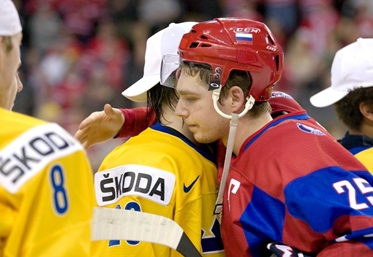Russia-Sweden 2.0
Russia-Sweden 2.0
Last year’s gold-medal game this year’s semis

 Swedish forward Mika Zibanejad consoles Russian forward Yevgeni Kuznetsov after scoring the OT winner in last year's gold medal game. Photo: J.C. Pinheiro / HHOF-IIHF Images
Swedish forward Mika Zibanejad consoles Russian forward Yevgeni Kuznetsov after scoring the OT winner in last year's gold medal game. Photo: J.C. Pinheiro / HHOF-IIHF Images
It did so in dramatic fashion, winning 1-0 on a Mika Zibanejad goal 10:09 into the 4-on-4 overtime after 60 minutes of scoreless hockey.
Zibanejad isn’t here this year – he’s developing NHL style in the minors – but the goalie is. That would be Makarov, who allowed the goal after making 57 consecutive saves in a remarkable performance that was one shot short of perfection.
Six Swedes from that game are in Ufa for today’s game, none of them back-end players. Eight Russians are back as well, including Makarov, two defencemen, and five forwards. One thing is clear. If the game today goes as last year’s game, Sweden will win easily in regulation. A performance like Makarov’s doesn’t grow on trees, and Ufa in winter is precious short of arboreal splendour.
In the last five years Sweden has won six of seven meetings between the two teams, but one would think this year is different. For starters, the game is in Russia, so depending on how you look at it, Russia either has the advantage, playing before a hugely supportive crowd, or the disadvantage of having to deal with the pressure (see last night’s narrow escape versus Switzerland).
Playing their preliminary round game at the smaller Sports Palace, the Swedes have advanced a little bit under the radar. But they went undefeated in four games, earned a bye to the semis, and had the best goals differential in their group (+11).
Russia, the centre of attention here, has done nothing by surprise. Everyone knew their top forwards were world class, from Nail Yakupov to Mikhail Grigorenko to Nikita Kucherov, all of whom listened to the Swedish national anthem in tears after last year’s final game. Coach Mikhail Varnakov has alternated goalies Makarov and Andrei Vasilevski this year, and since Vasilevki started last night, it would make sense Makarov would play tonight.
Continue readingPerhaps, though, what is surprising is some of the things Russia hasn’t done. The team lags with only five power-play goals in 23 chances. Yet perhaps that’s a statistic that’s not surprising if you watch how the team plays. Russian hockey is such a remarkable beast. When it’s humming along, the players are zipping at top speed, working together, making crisp passes, and finishing with great shots.
When it isn’t working, as in last night’s quarter-finals game, the forwards play hog hockey. That is, the player who has the puck at centre ice goes in on the entire opposition and will either score or be checked off the puck or steered into the corner. Passing is an option worse than death. As soon as you see the Russians playing selfish hockey, they become vulnerable.
The Swedes, of course, play Swedish hockey, meaning good puck movement, disciplined play, taking advantage of scoring chances. They have ten power-play goals in four games and have a balanced attack. All six returnees from last year are forwards: Jeremy Boyce Rotevall, William Karlsson, Rickard Rakell, Sebastian Collberg, Filip Forsberg, and Victor Rask.
Both teams have shown themselves to be vulnerable. The Swedes needed OT to beat the Swiss and blew a three-goal lead to Finland; the Russians lost decisively to Canada and narrowly averted elimination at the hands of the same Swiss.
Both teams have great goaltending, the aforementioned Russian duo opposed by another tandem playing alternating games, Joel Lassinantti and Niklas Lundström. What the Swedes have in balanced attack the Russians have in a smaller core of more gifted players. A comparison of the defence likely yields little in the way of huge advantage either way.
The difference tonight will come down to execution. Which team scores with the man advantage? Conversely, which team stays out of the penalty box? Can the Swedes do like the Swiss and take away the middle of the ice where those highlight-reel goals come from? Can the Russians play intense hockey against a wave of four Swedish lines? Can the Russians play passing hockey and not hog hockey? Which goalie plays better?
The usual questions, but the answers are always different. Tonight will be no exception.
Back to Overview





















































